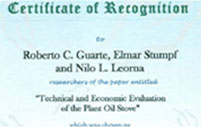

 |
|
| Content: |
|
| - | Market with Potential - The Intoduction of protos in Indonesia |
| - | protos Wins Two Major Awards in the Philippines |
| - | Tanzania: Breaking New Ground, Learning New Lessons |
| - | protos: pre-heating alternatives open up possibilities for new markets |
| - | New protos DSCs Established in Leyte |
| - | Promotional Activities of protos in the Philippines |
| Site Info BSH Bosch und Siemens Hausgeräte GmbH BSH Protos Team Carl-Wery-Straße 34 81739 München, Germany www.plantoilcooker.com Samuel Shiroff, Market Introduction Susanne Trojer, Engineering Content: |
|

This marks the first of an on-going series of newsletters dedicated to providing up-to-date information on the market introduction and technical development of the protos plant oil cooking technology.
The impetus for the newsletter came from thousands of inquiries that BSH received from around the world regarding the desire either to bring protos to a particular region, or from individuals interested in purchasing protos for personal use.
BSH is naturally pleased at the positive reaction to protos and we are very interested in disseminating the technology as widely as possible, as quickly as possible. However, we have taken care to learn from some of the less successful new technology introductions that have occurred in a variety of fields. We concluded that some of these technologies failed to live up to their promise for reasons that ranged from cost, to complexity, to a desire to reach too far, too fast. Although it is our desire to make protos available to as many people who can benefit from it as soon as we can, BSH is determined to carefully and methodically choose those regions where initial success is most likely. We will also dedicate our significant, but nevertheless limited resources to training, teaching and adapting our technology so that its use is marked by all three pillars of sustainability – environmental, social and economic. As you read this newsletter and the subsequent editions, you will see how BSH is pursuing this approach, which is fully aligned with the company’s identity and core competence.
With regard to those inquiries we have had from individuals living in Europe, America and other industrialized countries, who show interest in purchasing a cooker for their private use, we would like to communicate our appreciation for the enthusiasm for the technology. Concurrently, we must also request patience as we focus our resources on poor individuals in developing countries, who are our primary target group, and have not yet taken the necessary legal and organizational steps required to introduce a new technology in these countries. As we make progress on this front, we will inform you via this newsletter.
BSH is proud and enthusiastic about the market potential for protos. Nevertheless introducing a new technology – especially in a traditional area such as cooking – to new countries and a new market segment is a challenging endeavor. We appreciate the interest and support of partners and individuals who have reacted positively to this initiative. We hope you find this newsletter an informative resource for learning about our activities and will also make use of the BSH protos website – www.plantoilcooker.com – to communicate with us.
BSH Protos Team
Samuel Shiroff, Market Introduction
Susanne Trojer, Engineering

A country with over 230 million people spread among 17,000 tropical and generally quite fertile islands, the vast majority of Indonesians cook their daily meals on kerosene stoves or wood fires. With a clear recognition of the many issues that have arisen with the production of plant-oils in Indonesia, BSH nevertheless believes that the people of Indonesia themselves – rather than automobile drivers in the West – will benefit most from the environmental, health and safety as well as economic gains of using locally and sustainably grown plant-oils as source of energy. As BSH moves forward in Indonesia, it is carefully and meticulously ensuring that any plant oil used in its cookers are from sources certified as sustainable i.e. they do not compete with food production, do not destroy biodiversity, are grown according to internationally recognized sustainable agricultural practices and do not exploit local farmers. The plant oil on which BSH is primarily concentrating in Indonesia is Jatropha Curcas.
Households in Indonesia burn an average of six to nine liters of highly subsidized kerosene each week. Cooking with kerosene can be dangerous both in the short and long-term. Fires are relatively common and the emissions from a kerosene stove can be more than ten times higher than cooking with protos. Thus, the individual consumer can benefit while the country as a whole can also reduce its dependence on imported kerosene, making protos potentially the right technology for many of the country’s households.
BSH will conduct a field test beginning in Nov. 2007 in three cities on the main island of Java which alone has a population of 90 million. Forty cookers each will be tested in Jember and Malang – in the East – and in Bogor in the west of the island just outside of Jakarta.
BSH is conducting the test in partnership with The Indonesian Crop Estate Research and Development.
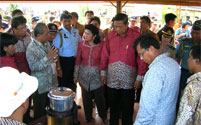 |
| The director of ICERD, Bambang Prastowo, explaining protos to the Indonesian President, Susilo Bambang Yudhoyono, and the first lady during a national event |
The Indonesian Crop Estate Research and
Development:
The Indonesian Crop Estate Research and Development (ICERD) is a research unit under the Research and Development Center for Agriculture, which conducts research and creates recommendations for agricultural plantation development in Indonesia. The ICERD is supported by four technical research centers, with a focus that includes medical herbs and aromatics (Balittro), fiber and oil industries, coconut and palm plants, spices and industrial and other plants. As the key partner for BSH during the field tests and survey, ICERD is providing key assistance in the process of understanding how to best adapt the technology to local needs. Via the field tests in 3 medium-sized cities on the island of Java, ICERD is helping BSH to learn how best to serve the vast number of potential customers in Indonesia.
One of their national tasks is to help develop bio-energy from jatropha plants. Research is currently underway to obtain jatropha varieties that can produce high levels of jatropha oil. The oil produced can be used as bio-diesel or bio-cooking fuel as a substitute for fossil fuel. The plant oil stove protos is an alternative for using jatropha oil in order to reduce the use of kerosene.
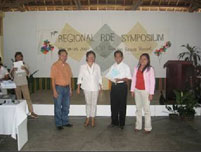 |
| Dr. Roberto C. Guarte (2nd from right) and Ms. Maricel Andrino (rightmost) during the awarding ceremony. |
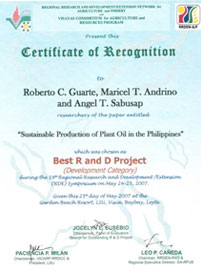 |
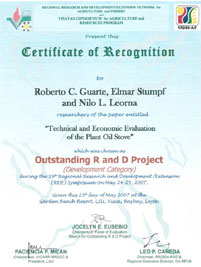 |

We are therefore very pleased that during the 19th Regional Research and Development/Extension (RDE) Symposium held on 24-25 May 2007, the project paper on the Technical and Economic Evaluation of the Plant Oil Stove, taken from the Plant Oil Stove Project in the Philippines funded by the BSH Bosch and Siemens Home Appliances Group and implemented by the Leyte State University, was awarded the Outstanding Research and Development (R & D) Award given by the Regional Research and Development/ Extension Network for Agriculture and Fishery and the Visayas Consortium for Agriculture and Resource Program.
The paper authored by Dr. Roberto C. Guarte, the project leader of the Plant Oil Stove Project in the Philippines, Dr. Elmar Stumpf of BSH, and Engr. Nilo Leorna, the team leader of the laboratory group in the Philippines, bested among 16 finalists selected from different academic, research, and government institutions in the Eastern Region of the Philippines covering eight provinces in the islands of Leyte and Samar. The project impressed the judges in terms of the novelty of its technology, the utilization of plant oil as a renewable source of fuel, the positive impact to the environment, and the enormous socio-economic benefits that can be obtained from the technology in terms of employment opportunities and other socio-economic benefits, savings of fossil fuel imports, and improvement of the health of the people, especially those families using firewood and kerosene as fuel for their cooking activities.
In addition, another project paper on the Sustainable Production of Plant Oil, a component of the Plant Oil Stove project, authored by Dr. Roberto C. Guarte, Ms. Maricel Andrino, and Engr. Angel Sabusap, both researchers of the plant oil stove project, was awarded the Best Development Project during the same occasion. The project has attracted the attention of the judges because of its potential for a sustainable production of plant oil in the rural areas through a small-scale decentralized scheme as an alternative to the centralized production scheme offered by big oil mills in the country. In this project, technologies and equipment for the production of plant oil like coconut oil have been developed and pilot tested in a coconut farmers’ cooperative. The technology and equipment for plant oil production on a village level scale are now ready for adoption by cooperatives and farmers groups.

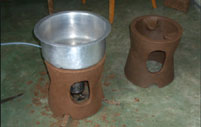 |
|
| The Tanzanian Clay Stove | |
The ability to produce protos locally was one of the basic premises and challenges of its design. Whereas economies of scale are important, BSH understood that costly transportation prices as well as tariffs, means that keeping the production costs of the cooker low, also means producing as much locally as possible. Moreover, local production means local jobs. Thus, the challenge was to find manufacturers with the right skills and equipment to produce the frame and tank for protos in an affordable manner. The Tanzanians however, had a better idea – rather than copying the German design, why not adapt the stove frame to traditional Tanzanian cookers?
After several attempts, the Clay Cooker design was born. Not only is the cooker less expensive to produce and more attractive for local users, it has several additional, unexpected technical advantages. The clay stove design eliminates the needs for a wind shield, acts as a better sound absorber for even quieter cooking and has the added benefit of increasing efficiency. The clay absorbs some of the heat from the cooker, which means it can be used for warming for a significant time period after the burner has been switched off. The innovation has so many advantages that BSH is also exploring where else, in the various regions where protos is introduced, that such a design is possible.
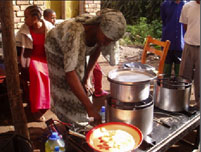
Introducing a German technology to a rural African town is never a sure thing. A technology that is aimed at such traditional and age-old habits such as cooking is an even greater challenge. The protos and local management teams worked hard to organize demonstrations, training sessions and other information distribution channels throughout the field test. Local Distribution and Service Centers (DSC) were established with local shop owners so that cookers, oil and pre-heating fluid were available at convenient locations.
“Overall user-acceptance was surprisingly high,” explains global project manager Sam Shiroff, “as always, some of our test users were happier than others, but overall we were truly delighted with how the local community warmed to the cooker. Tanzania was really a test to see if we could adapt the technology to African sensibilities. Whereas we cannot judge our potential of success in other African countries by this measure, we would be a lot more concerned if we had learned that people did not like to cook with protos. Our orientation to adapt to local needs is the right strategy and the Tanzanians gave us some outstanding ideas.”
Hagen Lamparter, the local project manager elaborates, “Costs are perhaps the primary issue here and the Tanzanian users were remarkably creative to keep their costs to a minimum. Whether finding unique ways to make their own cleaning tools, or innovative repairs, we were constantly amazed not only at the solutions, but how effective they were. The clay stove solution is an example of how important it is to listen to your customers and take advantage of the incredible amount of wisdom they possess. No one knows better what they need than they do.”
Following a promotional event in August, the protos management team received over 800 orders for the cooker. This overwhelming response was strong evidence that Tanzanians in Arusha were impressed and enthusiastic about the possibilities of the technology.
Challenge: Plant Oil
Initial indications were that significant amounts of Jatropha oil would be available in and around Arusha within relatively short periods. Jatropha oil was originally viewed as the greatest promise in the region as a fuel source for protos.
Unfortunately, the new, strong and growing interest in plant-oils meant that not only were prices for seeds rising quite rapidly, but also that seeds were being used for additional plants, rather than for oil. Although this problem was seen as temporary, it nevertheless meant that alternatives were very much needed. Because protos can be run with any type of plant-oil, we were able to make use of the cottonseed oil that is also locally available. The test users were thus supplied with as much Jatropha as possible, but supplemented their fuel with cottonseed when necessary.
Despite the health, environmental and efficiency advantages of protos, the main selling point remains cost-competitiveness. Due to the price increases for the various types of oil during the test, it became necessary to ensure – via subsidies – that the price of plant oil for the users did not exceed the price of equally available liquid fuels – such as kerosene.
The management team is hopeful that the local availability of oil will increase over the next several years as jatropha plants reach maturity and the use of seeds for planting is replaced by their use for oil. Nevertheless, since a Jatropha requires three to five years to reach maximum output, there remains a significant time lag. Providing a subsidy for plant oil over the medium-term while waiting for an increase in production, is unfortunately, not an option.
Lessons Learned
Overall, the project in Arusha, Tanzania can be viewed as a very successful test. Not only was user-acceptance established, it was also possible to make some fundamental and replicable adaptations for protos in other regions as well. BSH is very pleased with the results and has collected a great deal of information regarding the needed processes, procedures, communication requirements and cultural necessities when introducing protos in similar regions.
The period of cooperation between BSH and ProBEC ends in December 2007. All partners recognize that sustainability must be the primary goal when introducing a new technology. In no circumstance is it sensible to continue with a project that does not incorporate all elements of sustainability: Environmental, Social and Economic.
The Tanzanian test clearly established the social and environmental aspects. Unfortunately, the current state of the availability of oil, and its relative local price, made achieving economic stability under the current circumstances a challenge that could not be overcome. The management team established that as plant-oils which are currently in the growing phase become available, this situation may rapidly change. At present, however, a further expansion of the number of protos users makes no immediate economic sense. Moreover, it is imperative to avoid a circumstance that plant-oils that otherwise would be used for food purposes would be burned, thus increasing the price and creating hardship for some of the poorest members of society. As a result, the decision was made not to expand the test into a full market introduction until the oil-availability situation improves.

As BSH proceeds with the introduction of the protos Plant Oil Cooker technology in developing markets, we continue to work hard to improve the efficiency and economy to the greatest extent possible. Our researchers in the Philippines and India have established a method for pre-heating using the plant-oil itself – dramatically reducing costs where spirit is too expensive and improving the overall potential to reach some of the world’s poorest people. Users must simply place a small amount of the plant oil in the pre-heating tray accompanied by either rolled tissue paper or small amounts of cotton (readily available in the Indian market for instance). The paper or cotton is then lit and after 5-7 minutes of pre-heating, the cooker is then ready for full ignition. Customers who had been previously cooking with wood, charcoal or kerosene are very conscious of the per-meal cost and are therefore extremely pleased at the opportunity to use readily available and inexpensive plant-oils for pre-heating as well as cooking. Because burning plant-oil with tissue paper does increase emissions, BSH nevertheless continues to encourage users to preheat with spirit when affordable and available; however, with this new innovation, preheating is never a worry if the family is hungry
A picture of protos could be added here if deemed necessary
As protos head-engineer Susanne Trojer explains, “We were very pleased with this innovation because it allows us to potentially reach a lot more customers. As we develop protos and refine its uses, we need to remember that things are not always as ideal as in laboratory conditions. We want our users to have clean air. Whereas pre-heating with oil is not as clean as we would like it to be, five minutes of pre-heating still creates far less smoke than cooking an entire meal with wood or charcoal. With this new technique we provide our users with a viable alternative and we expand the scope of our potential market to places, in Africa or India for instance, where spirit simply is not readily available.”
 |
|
| new established DSCs. Map of Leyte showing the municipal- ity of Burauen and Hindang. |
|
 |
|
| The POTC project staff delivering protos units to the new DSM in Burauen, Leyte. |
|
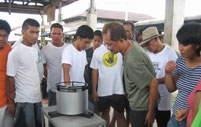 |
|
| Mr. Moises Neil Serenio, POTC staff, giving demonstration on the operation and maintenance of the stove to potential users in Burauen, Leyte. |
|
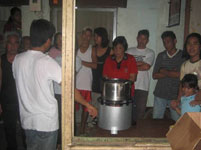 |
|

The DSC in Burauen is expected to cover three other nearby inland municipalities in Dagami, La Paz and Julita, as stipulated in the memorandum of understanding (MOU) signed between POTC and Mrs. Maria Fe Ongy, the proprietor. An official poster was set and posted on the display area indicating that protos is available to be purchased at the shop. Local project leader Dr. Roberto Guarte comments, “We select our distributors carefully based on an understanding of the market and the proprietor’s enthusiasm to sell the product. As with many new technologies, customers need greater care and more thorough explanations. Mrs. Maria Fe was very excited to be one of our distributors and we look forward to working with her.”
Prior to the distribution of the protos units, a thorough training on the operation and maintenance of the stove was conducted at the POTC on July 6, 2007 for the technicians working in the new distribution centers. These technicians are expected to provide technical assistance and troubleshooting to the stove users in their coverage area. To support the newly established DSCs in order to make the new availability of the cooker in the region as well known as possible, the POTC staff also conducted a demonstration on the operation and maintenance of protos in the municipality of Burauen.
The DSC in Hindang Leyte, managed by Dr. Estarmino Zafico, a medical doctor, was established on 16 July 2007 and will cover three coastal municipalities in Inopacan, Hindang, and Hilongos. An on-site training was also conducted in Hindang with an enthusiastic response from locals.
Whereas the new proprietors have been carefully screened, they still need to fulfill their obligations to remain protos distributors. The new DSC’s which still have a provisionary contract, will be evaluated in the next three months in terms of the numbers of units of the stoves sold and customer satisfaction with service. Their performance within three months will serve as basis for the renewal of the contract.
The POTC is currently strengthening its promotion and marketing activities of the stove by aggressively looking for interested people to become Protos DSC. The criterion in the selection of a DSC requires that he/she must:
- Have purchased and use Protos to ensure that he/she knows about the technology.
- Have financial capability to sustain the promotion and marketing of the protos.
- Have area with enough space for display and storage that is accessible to any type of vehicle and Protos users.
- Have undergone training or have technicians that are trained on the operation, maintenance, repair servicing, and troubleshooting of the protos, and
- Maintain a technical team for providing distribution and after-sales service to the end users.

 |
| Dr. Guarte with the NSCB 8 head and staff and stove users |
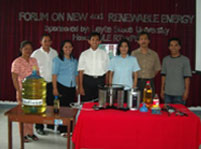 |
| Dr. Guarte with the NSCB 8 head and staff and stove users |
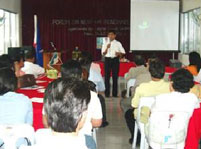 |
| Dr. Guarte on his presentation |
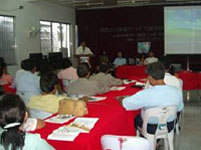 |
| Dir. Puguon on his opening remarks |
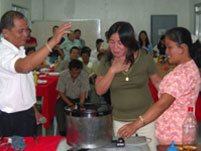 |
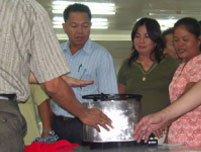 |
| Dir. Puguon on his opening remarks |
TACLOBAN CITY – In celebration of the 17th National Statistics Month, Leyte State University (LSU) sponsored a forum on New and Renewable Energy featuring the plant oil stove, which utilizes plant oil as alternative and renewable fuel. Dr. Roberto C. Guarte Project Director, Plant Oil Technology Center and Dean, College of Engineering and Agri-Industries, and Dr. Remberto A. Patindol, Head, Department of Mathematics, Physics and Statistics, spearheaded the activity. The forum, hosted by the Department of Labor and Employment Region 8 (DOLE RTWPB 8) and the National Statistics and Coordinating Board (NSCB) was held at the DOLE Training Center, Tacloban City.
Forty-seven (47) participants from the sponsor, the host, the local government unit of Tacloban, the media, hospitals, private sector, and other institutions attended the forum, which included business establishments like restaurants and catering services.
In his opening remarks, Forter G. Puguon, director of the Department of Labor and Employment Region 8 (DOLE 8) stressed that the event is the opening for the series of forums on New and Renewable Energy, which will be held in different regions of the Philippines.
Dr. Guarte’s presentation on New and Renewable Energy was the highlight of the forum. He stressed the need for a better source of energy, the renewable energy that basically does not harm the environment. Plant oil as a new and renewable energy is not a threat to the environment and the health of the people. The gaseous element emitted from the use of plant oil is environmentally neutral and safe according to Dr. Guarte. He stressed that the use of plant oil as fuel for the plant oil stove is a breakthrough in the cooking technology which will bring enormous benefits to the people and the country. In addition to being environment-friendly, the stove is also economical and practical since it can use any vegetable oil as fuel, and even used vegetable oil in the restaurants.
The two invited local users of the plant oil stove, Mr. Sisinio Balaga from Baybay and Mrs. Fe Perales from Ormoc, conducted the actual operation of the stove. Their demonstration proves the usability, practicality and functionality of the technology. Mr. Balaga and Mrs. Perales shared their experience in using the stove. Mr. Balaga has been using the stove for one and half years, for daily cooking needs. Mrs. Fe Perales uses the stove not only for household use but also for her sweetened banana business (banana cue). The participants inquired about the safeness of the stove, operating time, consumption, and operating cost. The users, on the other hand, gave answers to their inquiries based on what they experienced and the participants were satisfied with the information.
Mrs. Evangeline M. Paran, the regional head of the National Statistical Coordination Board Region 8, thanked Leyte State University for sponsoring the activity and for coming over to Tacloban to present the significant invention in her closing remarks. She extended her appreciation to the private sector, especially those from the business side, for attending the forum on New and Renewable Energy. Mrs. Paran was pleased because households from different parts of Leyte were the main beneficiaries of the project and acquired the firsthand experienced on the usage of this significant invention, the plant oil stove. She also stressed that quality data can lead to important inventions of new technology. Through this forum, the regional head of NSCB expects the empowerment of the consumers through responsive energy statistics.
German Month EXPO
MAKATI CITY – The month of October is celebrated as the German Month. The month-long celebration was held in Rockwell Tent, Makati City, showcasing various German products and services. German Ambassador to the Philippines, Dr. Axel Weishaupt, explained, “We would like to present Germany as a land of ideas to the Philippine public, since we are particularly proud about the innovative spirit which drives the modernization of our society from small town to big cities.”
 |
| Dr. Keller of GTZ with the POTC staff |
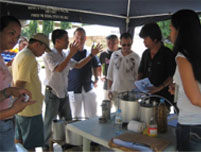 |
| POTC staff demonstrates how to operate the protos during the exhibit festival at Fuente Osmeña, Cebu City. |
CEBU CITY – The Environmental Legal Assistance Center (ELAC), a non-governmental organization in Cebu, invited the Plant Oil Technology Center (POTC) of the Visayas State University (VSU) to attend the Green Festival Exhibit in celebration of the World Health Day on June 9-10, 2007 at Fuente Osmeña Oval, Cebu City. The festival was a two-day event consisting of exhibits on renewable energy, organic farming, waste market fair and several lectures on climate change, recycling and environmental ethics. Its main objective was to arouse the awareness of the general public on pressing environmental concerns. The Pilot Marketing Group (PMG) of POTC represented by Engr. Elvira Ongy and Mr. Moises Neil Seriño, attended the exhibit and conducted an on-site demonstration of the Protos. The Protos attracted many people during the exhibit, who were mostly delighted and surprised by the idea of using plant oil as fuel. Seven units of Protos were sold at Php2800.00 per unit. Intensive training on its operation and maintenance was conducted before the stoves were released to the buyers. There were even 20 standing orders obtained from the spectators of the said exhibit. Many people inquired on how they can acquire the stove, the sufficiency of oil supply and necessary servicing of the stove.
Agri-Aqua Fair and Garden Show in Tacloban
TACLOBAN CITY – In cooperation with the annual celebration of the “Pintados Kasadyaan” Festival 2007 of the city government of Tacloban, the Pilot Marketing Group joined the Agri-Aqua Fair and Garden Show held at Capitol Grounds, Tacloban City on June 28-29, 2007. The show featured a Harvest Festival, Bangus Festival and Landscaping activities.
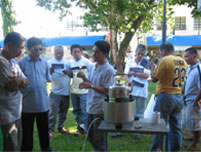 |
| POTC staff demonstrates how to operate the protos during the agro-fair festival exhibit at Tacloban City. |
Disclaimer
You are receiving this mail because you have opted-in to receive mail from BSH.
Your email-Address will only be used for sending messages to you from BSH.
If you don't wish to receive any more mail from us or if you would like to change your e-mail address or any other personal details please send a short notice to unsubscribe@bsh-group.de.
If you have any suggestions, comments or questions, we would be glad to help.
Please contact us at: comments@bsh-group.de
BSH Bosch und Siemens Hausgeräte GmbH, Carl-Wery-Str. 34, 81739 Munich
Chairman of the Supervisory Board: Rudi Lamprecht
Board of Management: Dr. Kurt-Ludwig Gutberlet (Chairman), Dr. Wolfgang Colberg, Jean Dufour, Prof. E.h. Werner Vogt
Registered Office: Munich; Registry Court: Amtsgericht Munich, HRB 75534;
WEEE-Reg.-No. DE 57986696
This message is for the sole use of the intended recipient(s) and may contain trade secrets or other confidential and privileged information. Any unauthorized review, use, copy, disclosure or distribution is prohibited. If you are not the intended recipient, please inform us immediately by reply e-mail and delete this message including any attachment or copies thereof from your system.

